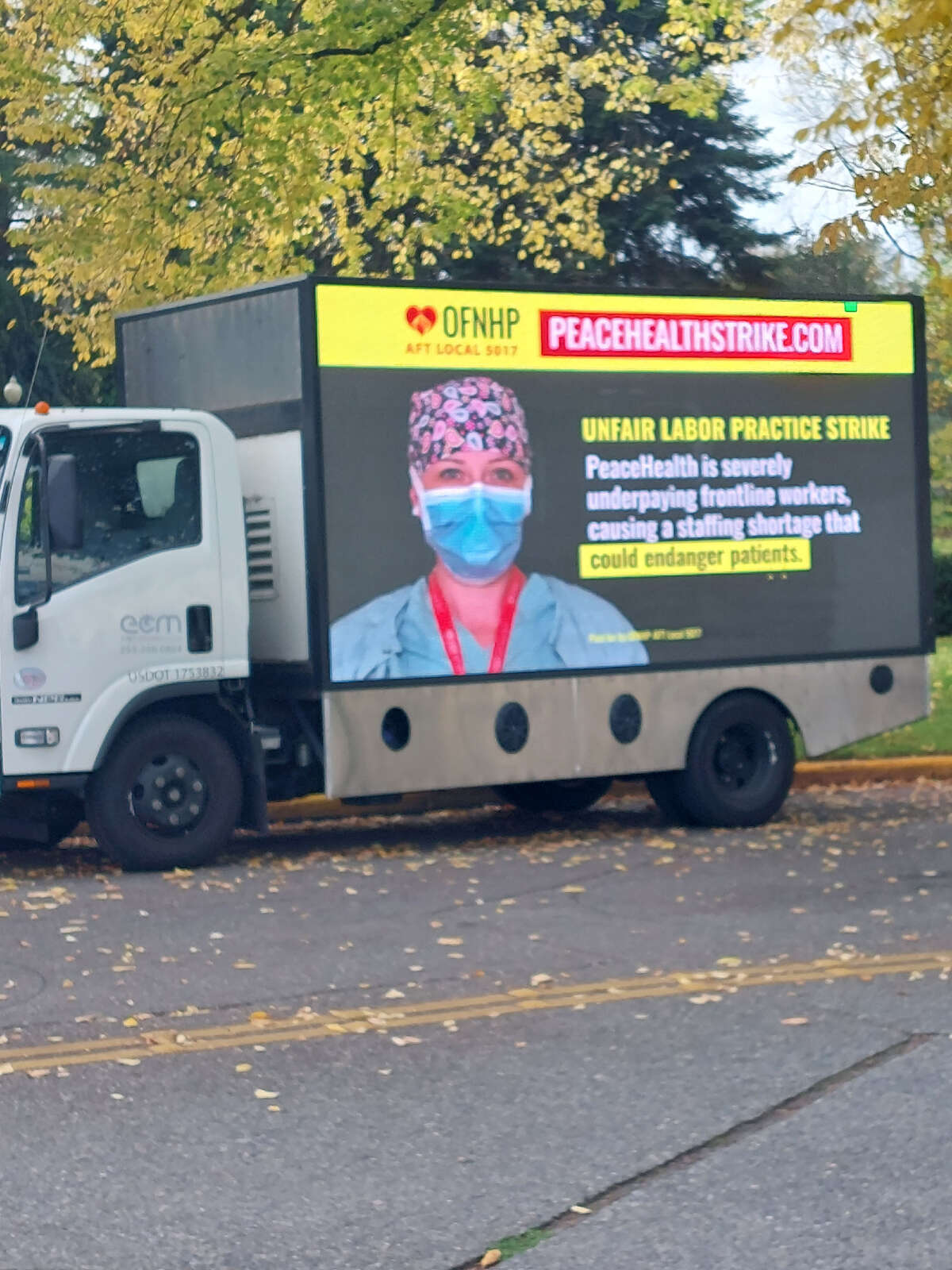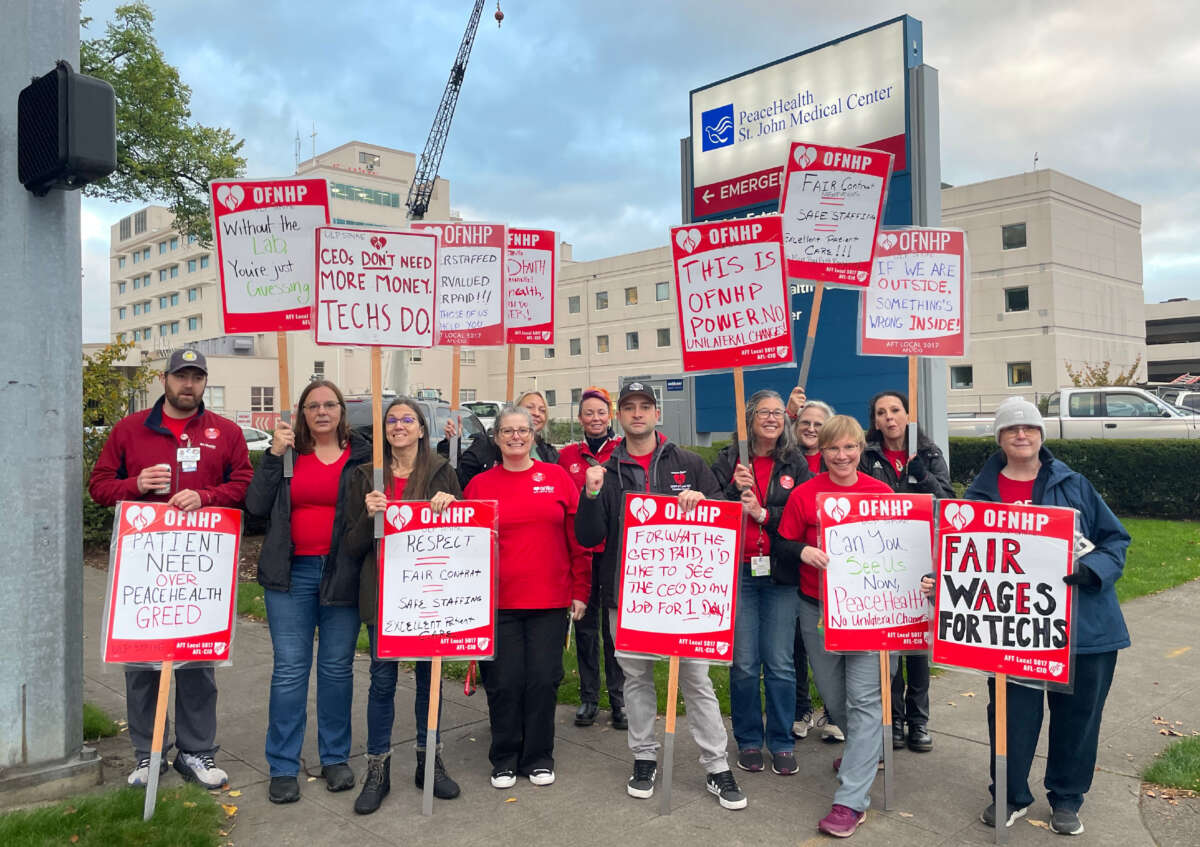Honest, paywall-free news is rare. Please support our boldly independent journalism with a donation of any size.
On Monday morning, over 1,300 unionized health care workers employed by PeaceHealth Southwest and PeaceHealth St. John in Washington State walked out of their workplace to commence a five-day unfair labor practice strike in protest of low wages, chronic understaffing and management’s canceling of bargaining sessions. They are represented by the Oregon Federation of Nurses and Health Professionals (OFNHP) and consist of workers in the tech, service and maintenance, and lab professional units.
After receiving notice of the workers’ decision to strike on October 13, PeaceHealth informed the union members that it would plan to cancel their health insurance plans, which lapse in November, if the strike were still ongoing at that time. This maneuver would have left many workers unable to afford essential health care for themselves and their dependents. As a result, the union decided on a five-day strike, rather than the initial open-ended strike. According to an OFNHP press release, PeaceHealth is offering at least $8,000 per week to strikebreaking traveling workers, which is more than double what the union workers make and far more than the wage increases they are seeking. A picket line of at least 1,000 strong wrapped around the PeaceHealth Southwest building in Vancouver, Washington.
PeaceHealth is a not-for-profit health care system that operates 10 hospitals and numerous clinics in the Pacific Northwest. In southwest Washington State, PeaceHealth is the only level II trauma center serving the community. PeaceHealth issued a statement addressing the strike on its website: “To date we have proposed highly competitive compensation packages that ensure our pay rates are market competitive … our communities can be assured that PeaceHealth has taken responsible steps to ensure we are able to deliver the same safe, high-quality care our patients and families have come to expect from us every day.” No mention is made on the website about staff-to-patient ratios.
And yet, workers at PeaceHealth express that their working conditions severely undermine their ability to care for patients. Some workers — especially those in maintenance, service and custodial positions — make less than $20 an hour. As Jonathan Baker, OFNHP president who also works as a medical lab scientist on a per diem basis put it in an interview with Truthout, “The workers are thinking, ‘do I have to choose between buying a medication or buying groceries? Do I have reliable transportation to even get to work?’ When you’re in the hospital do you want your health care worker worrying about these things? That worker is distracted. They’re walking around these floors concerned.”
Along with low pay, a primary concern of the workers is severe understaffing.
“When it comes to our nursing assistants, the recommended ratio is one nursing assistant to eight patients. We see one assistant to 20, 30 patients,” Baker told Truthout. “People have to work double shifts, 16-hour days. Night shift, day to evening shifts.… Health care workers are people too, and may make mistakes when they’re tired. That’s why we’re taking a stand. We’re seeing the safety concerns. Even the patients who come here — they’re in a vulnerable state — they’re not educated enough about what is not acceptable. We have seen how the status quo has affected patient care.”
Cassie Cook, a computed tomography (CT scan) tech at PeaceHealth Southwest Medical Center who requires monthly injections as part of her treatment for cancer, agrees. “It’s exhausting.… I worked during chemo in order to keep my health benefits. Being short-staffed and trying to provide good patient care — it’s next to impossible,” she told Truthout from the picket line by telephone; honks of support from passing traffic were clearly audible.
Cook pays $550 out of pocket, even with her health insurance, to afford these essential treatments. “For them to threaten to take away our health insurance when we’re trying to stand up for what’s right for safe staffing and better patient care, it scares people, because it makes a lot of people not want to strike … it’s been pretty stressful for a lot of employees…. I hope this gets resolved as quickly as possible. Everyone out here is not getting paid,” she said.

If the strike had lasted long enough for the workers’ health insurance to lapse, per PeaceHealth’s directive, Cook, who has a young daughter, would have been forced to pay over $3,000 per month for her cancer treatments; out-of-pocket coverage for her daughter is also $3,000. “It’s heartbreaking that we’re being treated like this. And it’s detrimental to our caregivers who need health insurance to survive,” Cook said. “We can’t provide good patient care when a third of our department are traveling techs [temporary workers on three-month contracts] who are paid twice as much as us, and we have to train them. It’s a revolving door. We can’t find permanent staff because of the wages that they’re offering.”
According to tax filings with ProPublica, PeaceHealth CEO Elizabeth V. Dunne, earned a base salary of $5,635,752, with $574,482 in additional compensation for the 2022 fiscal year. The next 15 highest-paid administrators earned salaries of between $1 million and $2 million, with “other” compensation mostly in the six figures per administrator. PeaceHealth claims to be offering a minimum of $17 an hour to caregivers, which it points out is above the Washington State minimum wage; in June 2023, The Seattle Times reported that renters in Washington need to earn $30.33 an hour to afford a typical one-bedroom apartment without spending more than 30 percent of their income on housing.
As for the staffing issue, an email sent to the workers and reviewed by Truthout, informs them of the cancellation of their health insurance, describing an offer of “A new staffing Joint-staffing subcommittee for the bargaining units of the Service and Technical units whose purpose is to identify and discuss current and developing trends, concerns, and opportunities related to hiring and staffing levels within the bargaining units of Service and Technical with the goal of improving working conditions and patient care.” In the email, PeaceHealth describes this proposal as “highly competitive.” Baker does not believe this addresses staff’s concerns. “What they want to do is establish a committee — they’ll meet with us to check a box. The language around the committee isn’t enforceable,” Baker explained. “They’ll meet with us, nothing will change, if it’s not mutually agreed upon, then nothing will be implemented, and we’ll be in the same position we were in before.”
PeaceHealth claims that it is providing a 16 percent to 17 percent increase over three years, a claim that Baker calls “misleading.” According to Baker, some positions, but not all, had market adjustments made to salaries. PeaceHealth’s figure, according to Baker, also included “step increases” which are based on experience. “It’s taking something completely out of context. You’re compensating somebody for their additional experience. You’re just making them whole.” Baker clarifies that they are seeking established minimums which address the costs of housing and rising living costs due to inflation. Bargaining will resume on October 31.
This strike comes on the heels of other historic strikes in the health care industry. This month saw the largest health care strike in U.S. history as more than 75,000 workers at Kaiser Permanente, represented by the Coalition of Kaiser Permanente Unions, held a three-day strike in protest of unsafe staffing ratios and low pay.
And in January, nurses at New York City’s Montefiore and Mount Sinai Hospitals, members of the New York State Nurses Association, won historic gains for safe staffing ratios following a three-day strike.
The PeaceHealth workers’ strike is part of this ecosystem. “It’s a manifestation of our health care systems. It’s a manifestation of what we’ve been told is the best health care system in the world.… How many injustices exist, how many barriers to access exist?” Baker said. “With that backdrop of others being empowered — people are saying no more. No more. I am not going to work anymore, being paid $18 an hour, being assigned 20 patients, with a manager who comes for me for being five minutes late.”
For other struggling health care workers facing low pay and understaffing at their workplaces, Cook has the following message: “Stay strong. And stay united.”
Media that fights fascism
Truthout is funded almost entirely by readers — that’s why we can speak truth to power and cut against the mainstream narrative. But independent journalists at Truthout face mounting political repression under Trump.
We rely on your support to survive McCarthyist censorship. Please make a tax-deductible one-time or monthly donation.
